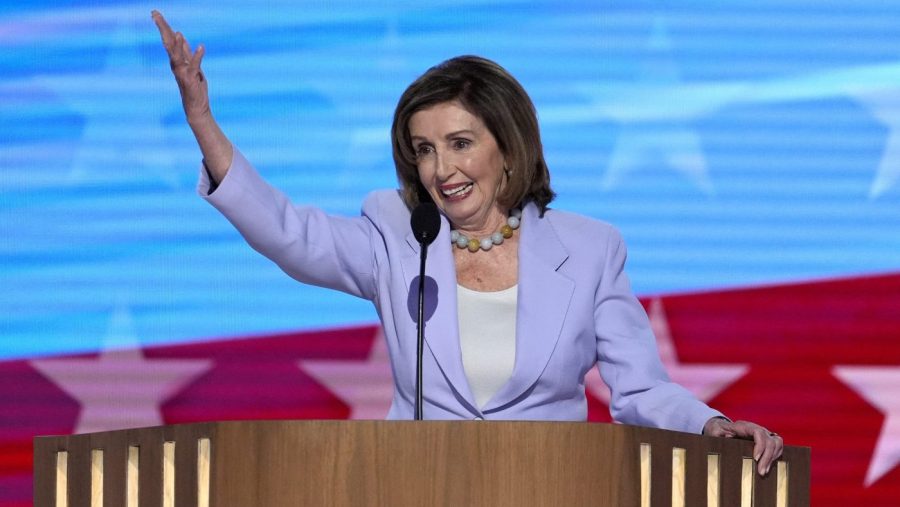Rep. Nancy Pelosi is calling it quits.
The California Democrat announced on Thursday that she will not seek reelection for another term, closing the book on a storied, four-decade career through which she rewrote history as the country’s first female Speaker; advanced some of the most consequential legislation of the modern era; and secured her place as among the most powerful — if polarizing — lawmakers ever to serve in Congress.
While Pelosi, 85, had already stepped down from her leadership seat at the start of 2023, she’d also made the decision — highly unusual for a top congressional leader — to remain on Capitol Hill in a lesser role.
For Democrats, the move cushioned the transition from Pelosi and her top deputies, who had steered the party for 20 years, to the younger crop of party leaders that she’d helped to groom, led by Rep. Hakeem Jeffries (D-N.Y.).
In that new capacity, Pelosi was able to remain an influential adviser and fundraiser for the party while relaxing her famously feverish schedule as she entered her mid-80s. (As Speaker, she said she slept four hours a night; as minority leader, she allowed herself five).
Her outsized influence was in full evidence during last year’s presidential contest, when Pelosi was instrumental in nudging then-President Biden off the ticket following a disastrous debate that sparked widespread concerns about Biden’s chances of defeating Donald Trump at the polls — and his ability to lead the country for another four years if he did prevail.
More recently, Pelosi played a prodigious role in securing the success of Proposition 50, the California redistricting effort designed to flip Republican seats to the Democrats in next year’s midterm elections. That ballot referendum — a direct response to Trump’s campaign to redraw the House maps across a number of GOP-led states — passed easily on Tuesday, clearing the way for Pelosi’s announcement about her future.
Even before Pelosi made her plans public, Democrat leaders in the Capitol were hailing her as an historic figure whose influence will resonate long after her departure.
“Nancy Pelosi is an iconic, legendary, transformational figure, who has done so many things over so many years to make life better for so many people,” Jeffries told reporters on Monday.
Pelosi was a relative late-comer to Capitol Hill, winning her first congressional race — a special election in 1987 — when she was 47 years old and had already raised five children. But she was no political novice, having spent years on the front lines of Democratic politics in California, including a seat on the Democratic National Committee and, later, as head of the California Democratic Party.
In those roles, Pelosi honed a mastery of networking and learned the matter-of-fact value of political fundraising — two lessons that served her well when she arrived on Capitol Hill.
Pelosi also sat on two powerful committees, Appropriations and Intelligence, where she rose in prominence amid high-profile clashes with the administration of George W. Bush. As the senior Democrat on the Intelligence panel, for instance, she challenged Bush’s claims that Iraq had powerful weapons that posed a threat to American interests. She still characterizes her vote against the Iraq War as a moment of moral clarity.
In 2003, Pelosi jumped into the top leadership position of the House Democratic Caucus, replacing Minority Leader Dick Gephardt (D-Mo.), who stepped down to enter the 2004 presidential race.
Three years later, Pelosi would lead the Democrats into the House majority for the first time since Rep. Newt Gingrich (R-Ga.) seized the chamber for the Republicans in 1994. In the process, Pelosi shattered the glass ceiling as the first woman ever to ascend to the House Speakership — a feat she repeated in 2019.
It was from that perch that Pelosi ushered in some of the most significant legislation of the last half century. Under former President Obama, that list included the sweeping Wall Street reforms that followed the Great Recession and the Affordable Care Act — Obama’s signature domestic achievement that owed much of its success to Pelosi’s ability to wrangle votes from reluctant centrist Democrats. She still counts it as her single greatest accomplishment in the Capitol.
Republicans were swept back into power in the 2010 wave. But after eight more years as minority leader, Pelosi had returned to the Speakership by 2021, when Biden took office amid the COVID-19 crisis. In that second act, she helped to enact the massive pandemic relief bill, followed by enormous infrastructure and climate packages.
In between those two Democratic administrations, Pelosi clashed famously with President Trump, a political nemesis she recently called the “worst thing on the face of the earth.”
Pelosi led two impeachments of Trump in his first term; established the select committee to investigate the Jan. 6, 2021, attack on the Capitol by a mob of Trump supporters; and ensured that the House would reconvene after the rampage to certify the results of the 2020 presidential election.
Pelosi’s track record has ensured her spot in the history books, but not all the reviews have been positive. Republicans, for years, attacked the Democratic leader as a wealthy San Francisco liberal who was out of touch with the concerns of most Americans. In that mold, GOP campaign operatives spent millions of dollars seeking to make Pelosi the face of the Democrats, at large — a strategy that proved effective, at times, and frustrated centrist Democrats who yearned for a more moderate leader.
Pelosi’s 20-year tenure leading the Democrats — the longest leadership run in either party since the legendary Sam Rayburn (D-Texas) died in office in 1961 — was also a source of internal strife, since it created a leadership bottleneck preventing younger Democrats from rising through the ranks. Several times, Pelosi faced challenges to her leadership; each time she beat them back easily.
Pelosi’s prominence also took a toll on her family. In late 2022, a man broke into her San Francisco home and bludgeoned her husband, Paul Pelosi, with a hammer. The police said she was the intended target.
Weeks later, Pelosi would step down from her leadership spot. Republicans had flipped control of the chamber that year, but Pelosi suggested the impetus for her decision had more to do with the attack on her family.
In her floor speech announcing the decision, Pelosi urged the sides to put aside their differences and come together. The American experiment, she said, depends on it.
“American Democracy is majestic – but it is fragile,” Pelosi said. “Many of us here have witnessed its fragility firsthand — tragically, in this chamber. And so, Democracy must be forever defended from forces that wish it harm.”
The post Former Speaker Nancy Pelosi announces retirement appeared first on KTLA.




